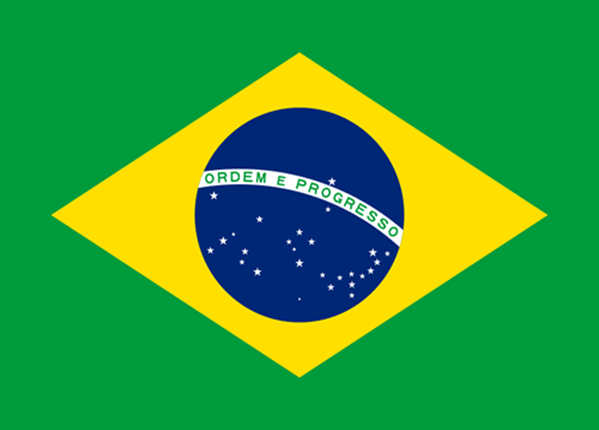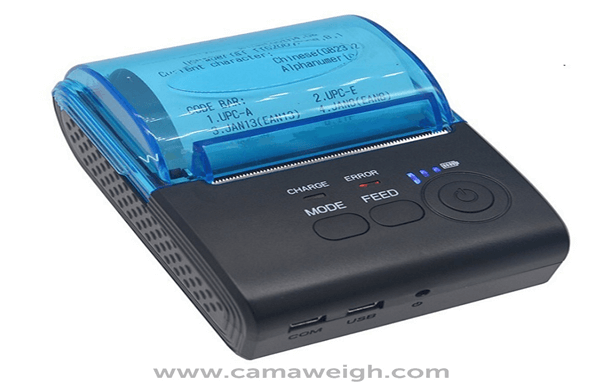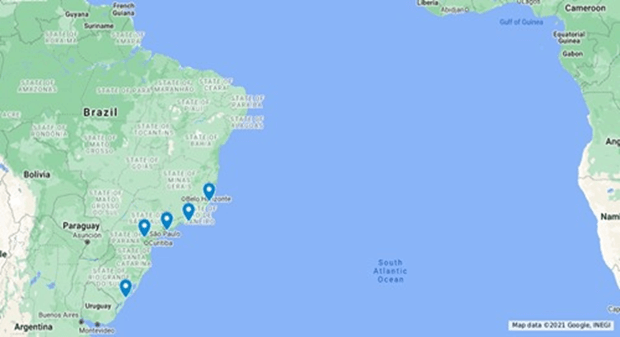
Introduction to Brazil
Brazil is located in South America
- It has a population of 213, 482,311 million people
- Capital: Brasilia
- Official language: Portuguese
- Total Area: 8.516 km2
- Currency: Brazilian real.
Economic Statistics of Brazil
Economic Overview:
- Brazil is the number 1 economy in South America.
- Brazil has a GDP of $ 1.84 Trillion.
- The largest industries of Brazil are Textile, Iron ore, Motor vehicle and parts, Steel, Chemicals and Petrochemicals, Cement, Pharmaceuticals, Consumer durables, aircraft, and Machinery.
Economy breakdown:
- Service sector: 63.25%
- Industry: 17.9%
- Agriculture: 4.4%
Main importers of Brazil’s goods:
- China 27%
- Germany 11%
- United States 18%.
- India 10%
- Switzerland 6%
- France 4%
Main exporters to Brazil:
- China 7%
- Netherlands 10%
- United States 24%.
- Argentina 8%
- Mexico 7%
- Korea 5%
The Manufacturing Industry in Brazil
The Manufacturing Industry contributes to Brazil’s economic growth yearly by at least 9% of GDP. The manufacturing industry in Brazil is strongly supported by government policies on infrastructure, industrialization, urbanization, innovation, and research and development.
The expansion and diversity in the different sectors of Brazil’s economy increased employment rates, salaries, and wages, as well as labor productivity levels in Brazil.
Some of the manufacturing Sub-sectors in Brazil include:
- Automobile and Parts Industry: Brazil’s automobile industry recorded about USD 60 billion in 2017. Brazil has attracted multinational companies such as Ford and General Motors. Research has shown that Brazil is in 6th position worldwide in terms of new car registration, making it one of the largest car markets.
- Pharmaceutical industry: Brazil’s Pharmaceutical industry has a global market share of approximately 3%, making it one of the world's top pharmaceutical markets. Disease such as COVID-19 has impacted the sector both positively and negatively. Positively, it has led to the expansion and growth of Brazil’s research and development sectors. Some of the Pharmaceutical weighing equipment that Camaweigh trade include:
- Electronics Industry: This is one of the fastest-growing sectors in Brazil’s economy, contributing to 4% of the national GDP. Some electronic equipment Camaweigh trades are:
- Thermo Printers are suitable for industrial uses of their efficiency and printing speed. These printers are also waterproof.
This industry uses weighing equipment to maintain consistency and accuracy and to further save time.

The Transportation and Logistic Industry in Brazil
Given the economic growth of Brazil, the demand for weighing scales in the transportation and logistics services in Brazil’s economy is diverse and is expected to increase. This growth is attributed to favorable government policies that support modern technology and innovation.
Urbanization, improved infrastructure, and increased systems digitalization in the transport and logistics industries are some of the factors encouraging international cooperation.
In 2021, Brazil’s Transportation and logistics industry is the main driver for e-commerce and development, accounting for 38% being online orders. Improved technological infrastructure and innovation aim to increase online purchases and transactions, further increasing efficiency in Brazil’s labor force.
Weighing scales are used in this industry to promote efficiency and accuracy.
Types of Weighing System Used in Transportation and Logistic Industry.
These types of weighing scales are applied to many industries, such as shipping, construction, agriculture, logistics, and vehicle.
- Crane Scales.
- Boom Barriers
- Weighbridges
- Floor Scales
- Axle Scales
- Wireless Portable Weighing Scales
- Traffic Lights and Displays Scales
- Indicators
- Heavy-Duty Cast-Iron Weights
- Logistic Scales
Sea Ports and Trading Hubs of Brazil
Brazil is accessible by both land and sea.
For international trading, the main seaport in Brazil includes Port of Santos, Port of Vitória, Port of Paranaguá, Port of Rio Grande, Port of Rio de Janeiro, Port of Itajaí, Port of São Sebastião, Port of Itaqui.
When exporting products to our clients in Brazil, Camaweigh uses the largest and busiest port of Santos.

What Weighing Scales does Brazil Import?
According to the latest trade data, some of the leading weighing scales that Brazil import include:
- Load Cells
- Crane Scales
- Counting Scales
- BMI Scales
- Baby Scales
- Wireless Portable Weighing Pads
- Floor Scales
- Pallet Truck Scales
- Wheel Chair Scales
What Regulations are there on Importing Equipment to Brazil?
The government of Brazil has regulations that guide the importation processes.
Importers are required by law to present the following documents to customs authorities for verification.
- Import Tariffs
- Certificate of Origin
- Document of inspection.
- Cargo release order
- Packing list.
- Insurance certificate.
- Commercial invoice
- Bill of landing.
- Certificate of weight and volume.
- Delivery order.
- Terminal landing receipts
Camaweigh will make sure to handle all logistic and document processes for your company and our worldwide clients.
Why Should Brazil Import Equipment?
- Quality of equipment – International manufacturers and authorized dealers have maintained a good brand reputation mainly based on consistency and quality upgrades. Local manufacturers have alternative equipment quality.
- Long-term agreement – Most companies are interested in creating a working relationship, which is why long-term contracts are important for manufacturers. Most local suppliers are driven by money and not working relations.
- Lack of enough resources - Brazil's manufacturing sector lacks enough raw materials, paving the way for importation.
- The high production cost - Brazil's manufacturing sector lacks enough raw materials, paving the way for importation.
Where Can I Buy Equipment for Brazil?
Camaweigh has been exporting a wide range of weighing equipment to clients in Brazil. Feel free to contact us at [email protected] or WhatsApp us at +86-131-2037-9271 for a FREE quotation.
We also ship worldwide; for other countries, check out our experience here.


 French
French Spanish
Spanish